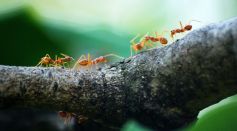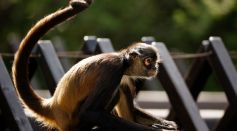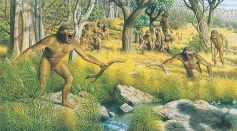Tags: Humans

What Do Humans and Monkeys Have In Common? Both Have The Ability to Determine Their Own Depression, Anxiety

Man in Uganda Beats Lion With Bare Hands In Bloody Battle Before Feasting on the Beast for Dinner

Giant 10-Ft Camels Hunted by Archaic Humans for Food Before They Got Extinct 27,000 Years Ago, Study Says

Ants May Soon Help Hospitals with Early Detection of Cancer in Humans, New Study Reveals

Crocodile Attacks 26-Year-Old Man Taking A Bath In a River In Namibia; Why This Aggressive Reptile Assaults Humans?

Artificial Intelligence Used in Weather Forecast: How Does This Technology Affect Human Actions?

What If the Moon Will Explode and Disappear? Living Things, Oceans, Ecosystem, and Climate Affected

COVID-19 Omicron Variant May Have Evolved in Mice, Instead of Humans

Humans With Tails? How Will the World Look Like if Human Ancestors Had Kept It?

Social Conventions in Baboons Naturally Emerge Like in Humans, Study Shows
3.7-Million-Year-Old Mysterious Footprints in Tanzania Were From Humans, Not Bears; Evidence Shows Earliest Proof Of Hominin Bipedalism

Primate Human Issa Found With Climbing Abilities Similar to Ape But Walked on Feet
DNA Reveals Brain Differences Between Humans and Chimpanzees; Researchers Grow 2 Cell Types to Compare

Elon Musk's Inspiration for His Love of Space: Increasing the Scope, Scale of Human Civilization Beyond Earth

How Earth Will Be By 2500 If Humans Do Not Act Now, Scientists Warn
Fossilized Footprints From 21,000 Years Ago Fuels New Speculation When Humans Arrived in the Americas
Humans Found to Be Clothing Manufacturers in Morocco 120,000 Years Ago Using Leather and Fur
Neanderthals Are More Advanced Species; Studies Show Complex Tool-Making Techniques, Excellent Working Memory

Laughing Pattern: New Study Reveals Babies Laugh Like Chimpanzees
Bottlenose Dolphins Burn Fat Slower as They Age; Possible Key To Understand Human Metabolism
Most Popular

Starlink Satellite Explodes in Orbit; SpaceX Confirms It'll Re-Enter Earth

Aurora Phenomenon: How Geomagnetic Storms and Space Weather Are Lighting Up the World

Ocean Warming Explained: Why Climate Science Shows Sea Temperature Rise Is Speeding Up

How Wildfires Start, Spread, and Ignite: Understanding the Causes and Fire Behavior Clearly





